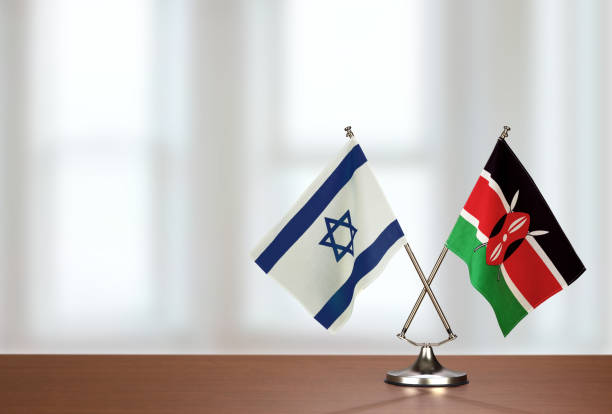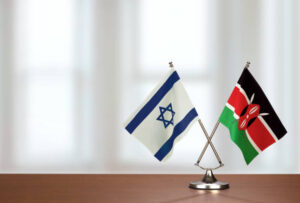
Kenya's Relation with Israel
Kenya’s relation with Israel has evolved significantly over the decades, characterized by moments of cooperation and shared challenges. This blog revisits the history of Kenya’s relation with Israel, looking at how the bond between these two nations has grown, reflecting their intertwined destinies.
Early Ties and Independence
In 1963, following its independence, Kenya’s relation with Israel began to flourish. The newly formed government under Jomo Kenyatta sought international partnerships to solidify its sovereignty.
Both nations established diplomatic relations, marking the beginning of a journey where they would navigate numerous challenges together. This initial connection rooted itself in their shared commitment to self-determination and national development.
Military Cooperation and Security Concerns
The relationship deepened in the 1980s, as security concerns took center stage. A pivotal moment occurred in 1985 when military cooperation was intensified. Israel provided training and military assistance to Kenya, aimed at strengthening the country’s defense capabilities.
This partnership arose from the recognition of regional threats, including the rise of terrorism, which later played a significant role in shaping their bond.
The Black September Attack: A Turning Point in Security Cooperation
In 1971, a significant event occurred that would influence Kenya’s relation with Israel: the hijacking of an Israeli airliner by Palestinian terrorists at Nairobi’s airport. This incident underscored the vulnerabilities both nations faced regarding security and terrorism. The dramatic situation highlighted the need for enhanced counter-terrorism strategies, leading to a deeper mutual understanding between Kenya and Israel. Both countries recognized that their security challenges were intertwined, prompting them to strengthen their collaboration in intelligence sharing and military training. This turning point laid the groundwork for a robust partnership that would continue to evolve in response to emerging threats.
The Impact of Terror Attacks
Kenya’s relation with Israel was profoundly influenced by a series of terror attacks. In 1998, the U.S. Embassy bombing in Nairobi, carried out by Al-Qaeda, killed over 200 people. This tragedy prompted Israel to extend support to Kenya, offering intelligence and security expertise. The bond between the two countries was reinforced, as both faced the pressing need to combat terrorism.
In 2002, another significant attack occurred when the Paradise Hotel in Mombasa was bombed. This event further solidified the partnership between Kenya and Israel, as security collaboration intensified in response to the ongoing threats posed by extremist groups. The shared experience of violence and the quest for stability were acknowledged by both nations.
Diplomatic Engagement and Economic Ties
As the 21st century progressed, Kenya’s relation with Israel continued to evolve through diplomatic engagement and economic initiatives. In 2012, a high-level visit by Kenyan Prime Minister Raila Odinga to Israel signaled a renewed commitment to enhancing ties. Discussions centered around technology, agriculture, and trade agreements, reflecting a mutual interest in economic development.
In 2013, Kenya upgraded its diplomatic mission in Israel to an embassy status. This upgrade was a clear indication of the strengthening relationship and a commitment to fostering deeper ties. Economic cooperation flourished, with Israeli investments in Kenya’s agriculture and technology sectors rising significantly.
Visa Waiver and Cultural Exchange
In 2015, the introduction of a visa waiver agreement facilitated travel and business exchanges between the two nations. This agreement allowed citizens to connect more easily, promoting cultural exchange and tourism. The growing people-to-people connections contributed to a positive perception of each nation within the other.
Moreover, events such as the Nairobi Summit in 2019, which focused on population and development issues, saw Israeli participation. This highlighted the collaborative efforts in health and development, showcasing the diverse areas of partnership between Kenya and Israel.
Navigating Regional Dynamics
The shifting geopolitical landscape also influenced Kenya’s relation with Israel. In 2020, Israel’s normalization of relations with several Arab nations prompted Kenya to adopt a balanced approach. The country sought to maintain its relations with both Israel and Arab countries, navigating the complexities of the ongoing Israel-Palestine conflict.
In 2021, the intensification of security collaboration was noted, particularly in the face of threats from groups like Al-Shabaab. Joint military exercises and training sessions were conducted, emphasizing the importance of counter-terrorism efforts in their partnership. The commitment to mutual security continued to be a cornerstone of the relationship.
Recent Developments and Future Prospects
As political dynamics shifted in Kenya, the election of William Ruto in 2022 brought renewed focus on enhancing ties with Israel. Discussions on technology and agriculture took center stage, reaffirming the importance of economic collaboration. Kenya’s relation with Israel appears to be on a promising trajectory, with both nations recognizing the potential for further partnership.
In 2023, ongoing counter-terrorism efforts solidified the bond between Kenya and Israel. Kenya and Israel prioritized intelligence sharing and military training, demonstrating their shared commitment to stability and security in the region. The persistent threat of terrorism underscored the necessity of their collaboration, reinforcing the notion that mutual respect and understanding root Kenya’s relation with Israel.

A Shared Journey Ahead
In conclusion, a series of historical events has shaped Kenya’s relation with Israel, reflecting both cooperation and challenges.From the early days of independence to the ongoing battle against terrorism, the shared history has created a bond that continues to evolve.
As both nations look to the future, their commitment to mutual security, economic development, and cultural exchange remains paramount. The journey of Kenya’s relation with Israel illustrates the resilience and potential of partnerships in an ever-changing world.





